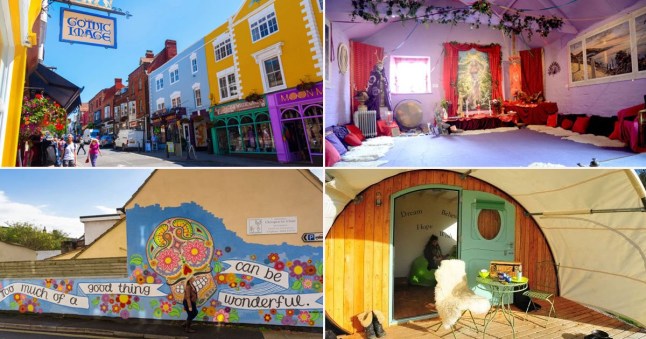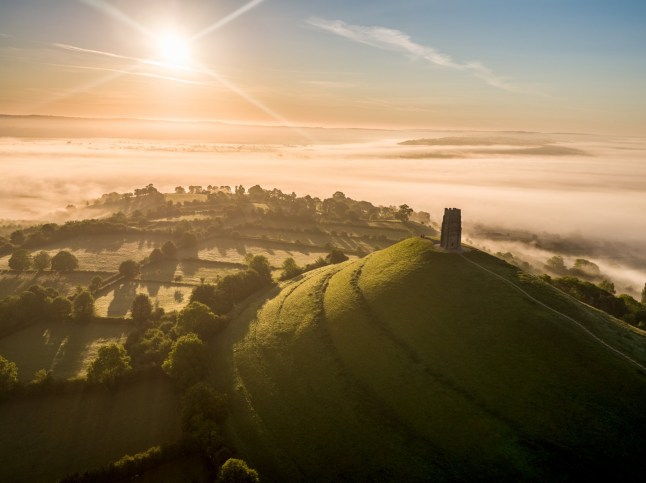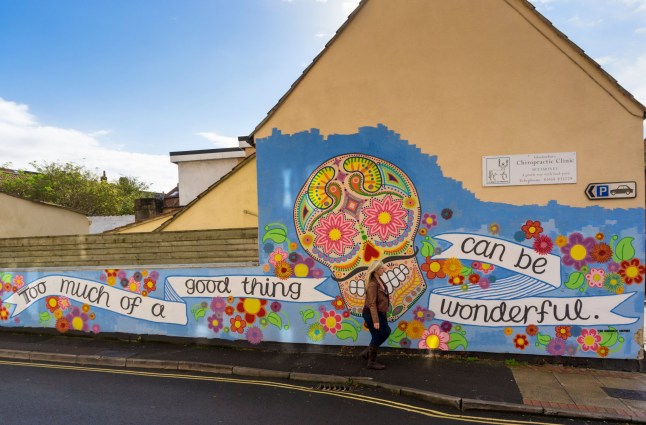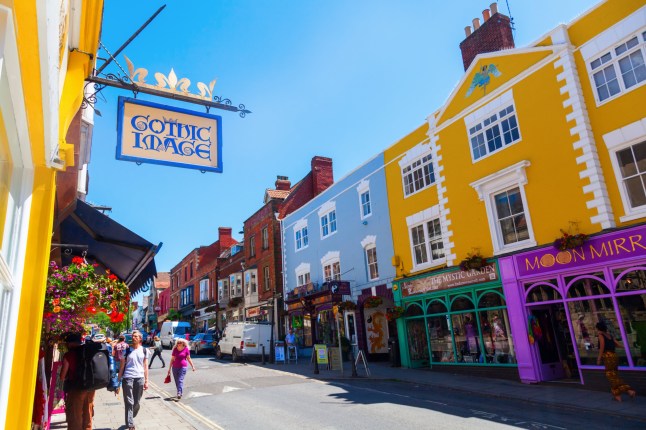
Dozing gently on a comfy velvet massage bed, all I can hear is the soft bong of a gong and what sounds like a baby’s rattle being shaken over my body.
My chakras are in a right old state, according to Bee Helygen, a priestess of Avalon and Cerridwen, who’s behind the humming, whistling and soft, sing-song chanting as part of her chakra-cleansing ritual.
An emotional healer, ceremonialist and Bach flower remedy therapist, I’m already bewitched by Bee, of the Glastonbury Goddess Temple.
Originally from Wales, she is just one of the many blow-ins drawn by the ‘unique spiritual energy’ of this unassuming Somerset market town.
I’m feeling a little zoned out as I lay here breathing in the fragrant smoke from the sage smudge Bee swirls around my ears.

All my senses are heightened, my limbs feel heavy and if I really focus, I can actually sense my frazzled chakras realigning.
OK, I admit, this is not my first rodeo into spiritual healing. Over the years, I’ve tried everything from aura cleansing in Essex to sonic healing in the Mojave Desert and know that in these uncertain times, it’s even more tempting to seek out spiritual comfort from the cosmos.
And where better than Glastonbury, a town teeming with myths and legends. Widely considered as the lost kingdom of Avalon, a mythical island based on
Arthurian legend where King Arthur’s Excalibur sword was forged, it’s here
it’s here that the Holy Grail was said to be washed in the reddy, mineral waters of Chalice Well, and according to Bee, it’s also the gateway to Annwn, the Underworld of the Goddess.

However, the town will forever be associated with its namesake festival, which officially turned 50 last year.
Originally called the Worthy Farm Pop Festival back in September 1970, Glastonbury Festival is held on Michael Eavis’ farm in the village of Pilton, seven miles east of Glastonbury, where there’s little more than a pub and a close-knit community who, despite their ups and downs over the years, largely embrace the festival.

Middlewick Cottages, where bands including Mumford & Sons often stay when playing the festival, is equidistant to Glastonbury and Pilton, and hidden in the shadows of Glastonbury Tor, a hill with huge spiritual significance.
I spend a night in one of its cosy camping cabins (from £80pn), where I can read by the starlight shining through its huge window.
At 5.30am, I join Middlewick’s owner, Jill, and her dogs on their daily walk up the Tor to watch the sunrise over the Mendips and in the distance, I can see the skeleton of the Pyramid Stage at Worthy Farm.
Back in Glastonbury, I take a self-guided Glastonbury Mural Trail, where much of the street art looks like it’s been painted while on mushrooms.


I join the enlightened with a glide down the High Street, where I pass a pair of stoned septuagenarians chatting to a tattooed, barefoot chap in purple harem pants.
What I notice about Glastonbury is its true lack of capitalism. Forget M&S and Starbucks – you’re more likely to be accosted by a velvet-clad ‘angel’ bearing sprigs of lucky heather, or handed an invitation for a free chanting in the shamanic healing centre, than find anything mainstream.
Naturally, vegans and vegetarians are well catered for here with earnest plant-based offerings from Excalibur Cafe and The Rainbow’s End.
My desperate need for good coffee takes me to the Hundred Monkeys, a trendy organic cafe which serves excellent vegan cake.

‘Many of our residents have ended up in Glastonbury because of the festival,’ says Tor Webster, a medium, healer and Glastonbury tour guide, over an oat milk latte.
Like lots of locals, Tor is often involved in the festival. In 2019, he held the opening and closing ceremonies for the Tipi Field.
But he tells me there have been mixed feelings about the festival from the local townsfolk.
‘There has been some resentment in the past, when the festival organisers didn’t want to be associated with the town because of its “dirty hippy” vibe. But it’s a lot better now,’ he says.
More Trending
Glastonbury town is full of ceremonial workers, spiritualists, psychics and healers and that often spills out into the festival.
‘When I walk around the festival now, every other person you see is a friend from town,’ says Tor.
I don’t know whether it’s chatting to him, or my newly realigned chakras, but I’m irrevocably drawn to Glastonbury’s charms and already contemplating selling up, buying a campervan and booking my high priestess course in time for next year’s festival.
Book your dream holiday now!

Set sail to the Mediterranean in 2025 – here's all you need to know

Private beach clubs, Art Deco delights and the world’s second-largest reef on the ultimate Caribbean cruise

Top 10 travel brands you need to know about for tour next adventure

British Airways makes major change to loyalty programme — and travellers aren't happy

The simple math that can get you 61 days off work this year
Peace out, man.
What actually is a druid? The Archdruid of Avalon, Dreow Bennett, explains

‘Druidry is not a religion, it’s a spiritual path. It’s more like Buddhism, a path that’s in pursuit of truth.
My role in Glastonbury is as a spiritual counsellor and advisor, I also perform at public ceremonies and at our seasonal festivals.
Druid ceremonies have pagan roots. We gather together in a circle and call the elements – earth, air, fire and water – from the four directions – north, south, east and west – and ask for their support and blessing.
I also perform these ceremonies for people’s personal journeys – births, marriages, funerals or, as I call it, hatches, matches and dispatches.
I wear the traditional long white robes, as it’s what people expect. There’s an element of theatre to all ceremonies and rituals but it brings everyone’s focus to a common point and that’s how the magic works.’
Do you have a story to share?
Get in touch by emailing MetroLifestyleTeam@Metro.co.uk.
MORE: BBC Music to air special Glastonbury Live programme after technical issues blighted livestream
MORE: The Hot List: UK staycation experiences from Sussex to Snowdonia













